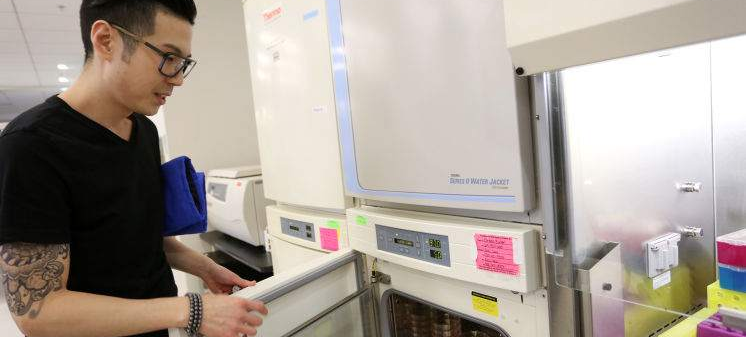Miles for Moffitt Research Spotlight: Dr. Eric Lau
Miles for Moffitt means a lot of different things to a lot of different people: cancer survivors celebrating their survivorship; community members joining together to fight cancer; the race, of course; the fun and celebration. But for Moffitt Cancer Center researcher Dr. Eric K. Lau, Miles for Moffitt means all of these things and so much more.
“Logistically, what it means is to be able to pursue innovative research that might otherwise not be funded by grant agencies that generally look to fund more established projects,” Dr. Lau shared when asked what impact Miles for Moffitt has on him and his laboratory. “Because of the funding, we were able to springboard our project about a year and a half ahead and get five years’ worth of funding for a much more expanded project.”
The funds raised by Miles for Moffitt are invested in projects that have the potential to be the next major cancer breakthroughs with high potential for translation into the clinic to benefit patients. Many of these projects are conducted by young investigators, and in funding the research, these funds also help to provide crucial training for the next generation of young scientists. Every dollar raised by Miles for Moffitt participants goes to innovative research like the type Dr. Lau is spearheading in his laboratory at Moffitt. One of the research projects in Dr. Lau’s laboratory started in 2016 with a $100,000 Miles for Moffitt award. That project has since made groundbreaking advances and evolved into a significantly more expanded investigation that was recently awarded a federal $1.25 million research grant.
The research being performed in Dr. Lau’s laboratory involves the discovery that melanoma tumors reduce in size when treated with natural sugar called L-fucose. L-fucose itself has none of the negative side effects we usually associate with sugar — no increase in hyperactivity or negative health defects. (“We can probably drink bucket loads of it, and we won’t get diabetes,” Dr. Lau jokes.) Preliminary findings show that melanoma tumors fed with fucose are half the size of those that aren’t. Additionally, the numbers of metastasized tumors that spread to other organs are reduced by 50 to 60 percent. The Lau laboratory has discovered that the way L-fucose is causing tumors to seemingly shrink is by triggering a specific kind of anti-tumor immune response. These are groundbreaking, and potentially lifesaving, discoveries.
The next step is to figure out if there is a therapeutic application of these findings. In other words, can L-fucose be used as a treatment in cancer patients? Can it be combined with other therapeutic agents to increase efficacy while reducing negative side effects? “We really need to know how this sugar is being used by the tumor cells and immune cells. If it is an agent that exhibits some sort of therapeutic activity, what is the best context in which we can use it? When and how do we apply it?” says Dr. Lau about the potential use of his team’s research in the actual fight against cancer cells in patients.
“Over the past 2 years, since the Miles for Moffitt award, we have identified and determined exactly what kind of anti-tumor immune response that L-fucose triggers against melanomas,” Dr. Lau says, sharing the latest discoveries that are the next steps in defining the possible range of therapeutic utility of his team’s research.
Dr. Lau stresses the importance of grants like the one he received as a young researcher from Miles for Moffitt. “This type of funding is really promoting discovery-level — really cutting-edge — conceptual research that has a high likelihood it can be turned into something that can be a really impactful project.”
One hundred percent of proceeds fuel research and empower scientists at Moffitt Cancer Center to find a cure. Sign up for Miles for Moffitt today and join us in the fight against cancer on Saturday, Nov. 23.



